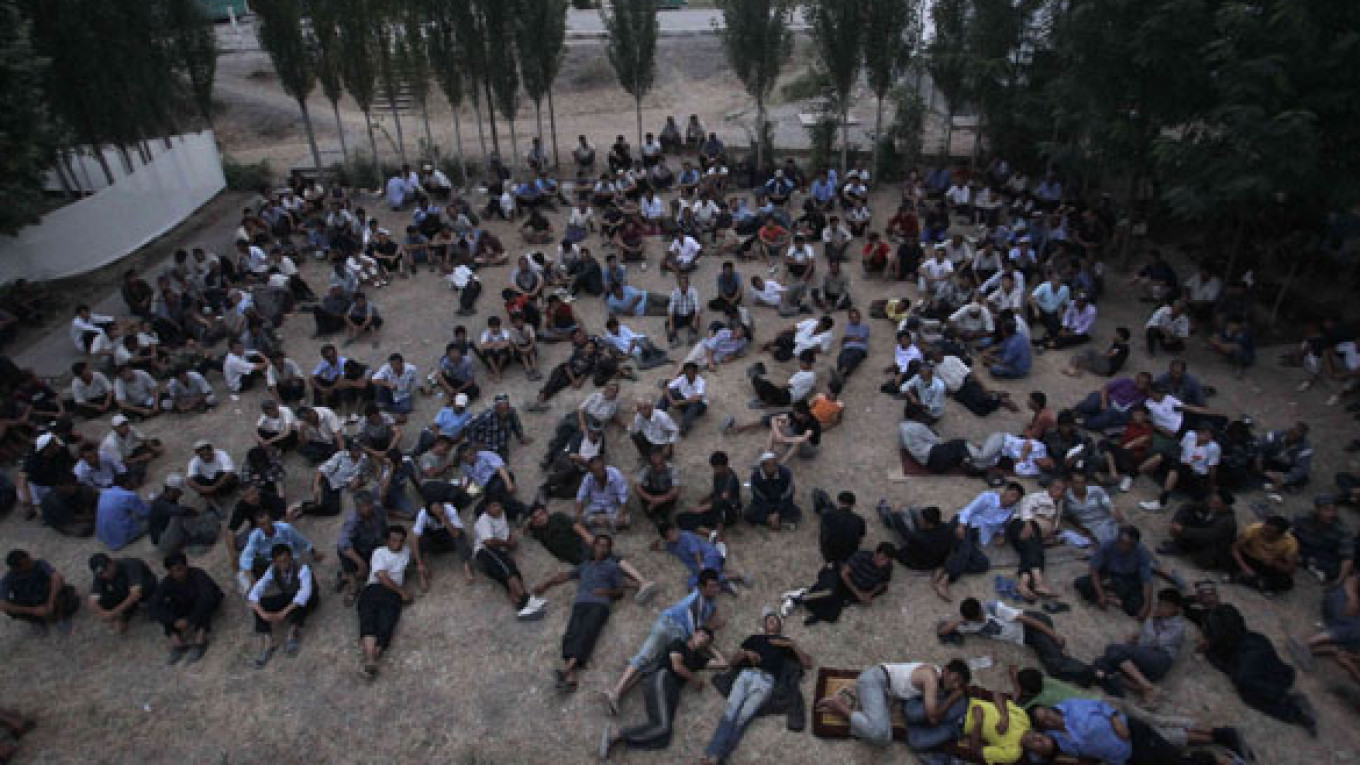OSH, Kyrgyzstan —? Kyrgyz forces started removing barriers dividing the burned-out city of Osh on Sunday as the government extended a state of emergency in some regions where up to 2,000 people have died in ethnic clashes.
Cars, tires and piles of scrap metal, however, remained in place across alleys in central Osh leading to neighborhoods occupied by ethnic Uzbeks, still fearful of more violence.
“We have become like Palestinians. They attack us with rifles, while we can use only stones,” said Mavlyuda Mamadzhanova, 53, an ethnic Uzbek who fled her home when it was attacked.
Ethnic clashes in southern Kyrgyzstan have caused up to 2,000 deaths and uprooted 400,000 people, who are crammed into squalid camps on Kyrgyzstan’s sun-parched border with Uzbekistan with little access to clean water or food. The United States and Russia, which operate air bases in Kyrgyzstan, are concerned that turmoil could spread to other parts of Central Asia.
The violence erupted June 10 with coordinated attacks by unidentified individuals in balaclavas and quickly led to fierce fighting between Uzbeks and Kyrgyz. Mainly Uzbek households were attacked in three days of unrest, with entire neighborhoods burned to the ground. The United Nations says an estimated 1 million people were affected.
Interim leader Roza Otunbayeva, whose government assumed power after President Kurmanbek Bakiyev was overthrown in a revolt on April 7, has struggled to assert control in the shattered south. On Sunday, the interim government extended the state of emergency in Osh and three surrounding regions until June 25, two days before it plans to hold a referendum on constitutional reform that would devolve more power to a prime minister. It was also enforcing a nighttime curfew in Osh.
Kyrgyz authorities in the city said the barricades should be removed to help restore normal life. Tree trunks, a truck-mounted crane and a bus had been removed and a few shops reopened along the main Navoi Street, named after a medieval Uzbek poet.
“They are ethnic Uzbeks, but they are Kyrgyz citizens. They are not restricted in their movements,” said a Kyrgyz security official at a police checkpoint, who declined to give his name. Armed with a Kalashnikov rifle, he was dressed in a T-shirt and dark glasses.
Uzbek residents, however, are afraid of more violence. “We no longer trust these patrols. Last time, they only cleared the way for these gangs,” said Hairulla Jalalov, 53, who was helping coordinate refugees in an outlying district of Osh. He said the cut above his eye was caused by a stray bullet.
Sabir Mirzasharibov, 42, a construction worker in central Osh, said there would be no escape should more clashes break out: “We will die and that’s that. We’ve got no other way out.”
The U.S. envoy for Central Asia, Assistant Secretary of State Robert Blake, on Saturday urged Kyrgyzstan to create conditions for a safe return of refugees.
Kyrgyzstan’s tiny, underequipped army has struggled to bring order to the south, and relief organizations have been unable to reach the worst-affected areas for security reasons.
Besides camps on the Kyrgyz-Uzbek border, some refugees are living in desperate conditions on the outskirts of Osh. In one such district, Dekhkan Kishlak, around 1,500 refugees were crammed into houses. Some lived in stables and kennels made of concrete and iron, once used to breed fighting dogs.
“I know nothing certain about our future,” said Ergash Akhmetzhanov, 76. “Most probably we will have to go to the other life. We have nothing left.”
A Russian Defense Ministry source said Friday that the ministry was considering sending troops to Kyrgyzstan to guard strategic facilities, RIA-Novosti, Itar-Tass and Interfax reported. Otunbayeva told Kommersant in an interview published Friday that her government had asked Russia to send troops to guard vital facilities such as reservoirs and hydroelectric power plants.
President Dmitry Medvedev said the United States should quit its air base in Kyrgyzstan once NATO-led operations end in nearby Afghanistan, a sign of chafing at the U.S. presence.
“This base … should not exist forever, it should resolve specific tasks, in my opinion, and wrap up its work,” Medvedev said in an interview with The Wall Street Journal posted on the Kremlin web site on Friday ahead of his U.S. visit this week.
A Message from The Moscow Times:
Dear readers,
We are facing unprecedented challenges. Russia's Prosecutor General's Office has designated The Moscow Times as an "undesirable" organization, criminalizing our work and putting our staff at risk of prosecution. This follows our earlier unjust labeling as a "foreign agent."
These actions are direct attempts to silence independent journalism in Russia. The authorities claim our work "discredits the decisions of the Russian leadership." We see things differently: we strive to provide accurate, unbiased reporting on Russia.
We, the journalists of The Moscow Times, refuse to be silenced. But to continue our work, we need your help.
Your support, no matter how small, makes a world of difference. If you can, please support us monthly starting from just $2. It's quick to set up, and every contribution makes a significant impact.
By supporting The Moscow Times, you're defending open, independent journalism in the face of repression. Thank you for standing with us.
Remind me later.


